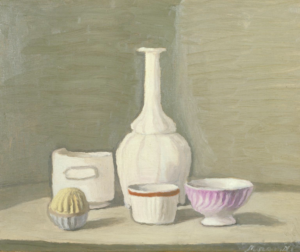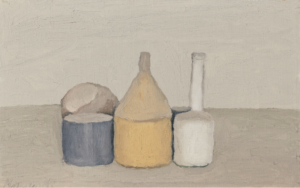The Captivating Impressionism of Giorgio Morandi
The culture and business of art is largely chauvinistic. Ninety-eight percent of the art that is made in one country stays in one country.
But there is a class of art that crosses borders: the work of artists that – for a variety of reasons – become known and coveted all over the world.
This is especially true for Modern art – the output of artists from the late 19th to the third quarter of the 20th century. Walk into any mid-sized museum of art in America and you will see, in the Modern section, the works of artists you will recognize from the US, but also from France, Holland, Belgium, Spain, Germany, and England.
But there is one European country that is sparsely represented: Italy. I don’t know why that is. But until I began to visit Rome’s Museum of Modern Art about 20 years ago, I had no idea how many fantastic Italian Modernists there are – every bit as great as their European and American contemporaries.
I’ve been back there almost every year, and I always have the same thought: How come I never heard of these artists? I mean, everyone knows Giorgio De Chirico and Amedeo Modigliani. But what other Italian Modern masters can you name?
De Chirico and Modigliani are way out of my price range. But even the less famous but no less brilliant Italian Modern masters are highly coveted and hard to come by.
Two of those I most coveted were Gisberto Ceracchini (1899-1982) and Giorgio Morandi (1890-1964). About 20 years ago, I could have bought a good-sized painting by either one of them for less than $50,000. About 15 years ago, I came across a fantastic Ceracchini in a Roman gallery and got it for a bit more than that. And I’m glad I did. Not only do I get to look at it every day, its value has increased by many multiples.
But Morandi was the Italian Modernist I coveted the most.
Morandi was an Impressionist with a minimalist approach to his subjects, which were primarily still lifes. As Andy Battaglia said in a recent issue of ARTnews:
“His still lifes of bottles arranged against neutral backgrounds – his favored mode of expression – strike some as boring but others as boundless in their charms. They’re the kind of paintings you can look at for ages while regaling in their quietude. And they’re the kind of paintings that make the pleasure of doing so feel like you’re looking at painting itself – the act, the result, the mysterious means of communication that can exude from a canvas.”
When I first spotted Morandi about 20 years ago, I could have afforded to buy one of his paintings. I don’t usually rue what might have been. But in this case, every time I see one of his still lifes go on auction, I think, “Damn! I could have had that in my living room.”


 MarkFord
MarkFord